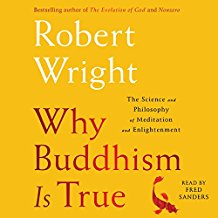“Why Buddhism is True: The Science and Philosophy of Meditation and Enlightenment,”
by Robert Wright
We may think we see the world around us clearly, but our view is distorted by the powerfully magnetic influence of natural selection – our genes’ insistence for us to see everything in terms of passing themselves on to a new generation.
One thing is universally true of all delusions: it is the overestimation of how much happiness the anticipated pleasures will bring. We are powerfully drawn to sensory pleasure, even though the derived satisfaction ends up fleeting at best.
At the center of this self-deception is the “self.” The belief in a “self” is the root of all suffering. The less you judge things through the vantage point of the “self,” the more clearly you will see their true nature.
Think about your “self” for the moment. It certainly feels as if your “self” decides what to do, how to navigate through the day. Scientifically, the actions taken by the right hemisphere of the brain are justified, rationalized after the fact if you will, by the left hemisphere.
By default, we think mostly self-referential thoughts, and it is in this stream of consideration where we imprison ourselves. Wright describes the “self” not as one entity but as a series of emotions (“modes”), each dominating the psyche at any one given moment. In all this, “the conscious ‘you’ isn’t choosing feelings, as much as being commandeered by them.” The “self” in charge at the time is simply the feeling that won out over other, competing feelings.
Buddhism encourages a shift in perspective, to one where your "self" doesn’t exist, one where your thoughts are passing before you, rather than emanating from you.
Look at a person who is enflamed in a passionate activity. It is not reason alone that will talk them out of this fever, as David Hume observed. Rather it would take a contrary impulse of equal passion to retard the existing one. And it is this stream of considerations that engulfs the person.
Every thought is driven forward by a feeling. Those feelings are the doing work of natural selection, goading people into approaching, or avoiding, things that would be beneficial, or detrimental, all in the act of carrying forward the genes.
How does the drive of natural selection distort the truth? “This planet is full of people operating on the premise that their interests trump the interests of pretty everyone else on the planet. Yet it can’t be the case that everybody is more important than everybody else,” Write observes.
Buddha was not alone in observing all this self-foolery btw: Jesus also advised us that “our perception of the world is distorted, and that we should work on correcting our blind spots, rather than complaining about the blind spots of others."
Yet knowing all this doesn’t get you a get-out-of-jail-free card. This is why you the need the meditation. Escaping the prison of the self, however is no easy task. But you may find that the more you examine your own feelings, the more the energy drains away from them
More Quotes From The Book Here...
